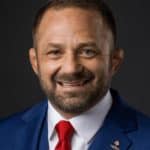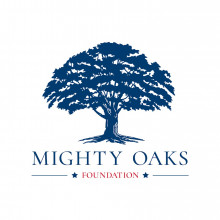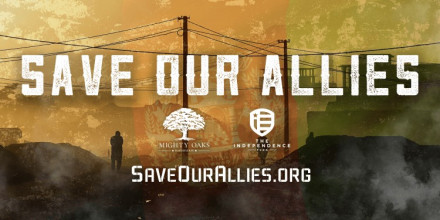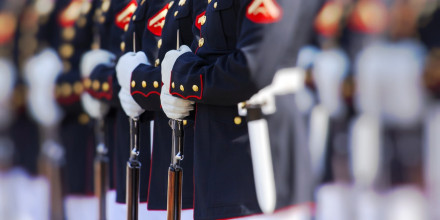
The War of Words
In this Adventures in Odyssey drama, a carelessly uttered word from Eugene creates havoc as it becomes the fashionable insult, resulting in a lesson about the power of words.
Home » Episodes » Focus on the Family Broadcast » Rescue in Afghanistan: A Veteran’s Story
Preview:
Chad Robichaux: You know, most of our team are Christians. And, uh, we all just watched God orchestrate that none of us are capable of doing, because what we did, uh, was not possible by even- even … We- we have very high-level professionals and experienced people. But what happened is s- you know, beyond explanation, to get that many people out in that period of time, uh, with no one getting hurt, uh, you know, on our team.
End of Preview
John Fuller: That’s Chad Robichaux sharing about the amazing efforts behind the scenes in Afghanistan. He’s our guest on Focus on the Family. Your host is Focus president and author Jim Daly. I’m John Fuller. And we’ve all seen the news about the troubling, different circumstances in Afghanistan. And I do hope you’re praying for our Christian brothers and sisters and other vulnerable people left behind after the recent evacuation from the country. Now, as we go along, uh, giving an insider’s perspective on that situation, just be advised, uh, parents, if you have younger children listening in, uh, you may want to have them occupied elsewhere.
Jim Daly: John, I wanted to talk to our guest today because he’s been on the ground. He’s been in Afghanistan: eight tours with the Marines. And, uh, he’s done a incredible, uh, thing here by getting many, many Americans and SIV, uh, Visa holders out of Afghanistan. And I think it’s gonna be important to hear from him about what’s going on, what motivated him as a veteran to get involved, but I think most importantly, uh, the spiritual element of what’s going on. You know, there’s a lot happening here, and it’s not h- purely a political issues. There’s so many things going on. And I wanted to get a first-hand report, again, uh, from Chad, our guest, about what is happening and what he has observed about what is happening as a Christian and as a soldier.
John: And Chad Robichaux is a former Marine with Special Forces. Uh, he’s the founder of Mighty Oaks Foundation, which serves veterans. He’s also been working with an organization called Save Our Allies, a coalition formed to help vulnerable Americans and allies and Afghan supporters of the U.S.
Jim: Chad, welcome back to Focus on the Family. It’s great to have you with us.
Chad: Thanks for having me on, Jim.
Jim: Yeah. Let me, uh, let me give people, um, actually, ask you to paint a picture of your background. You served, uh, eight tours in Afghanistan. You’re in the Special Forces within the Marine Corps. Uh, man. I’m in awe of you. You are my man guy.
Chad: (laughs)
Jim: (laughs)
Chad: Well, yeah. I, you know, I was very fortunate. Th- most … I come from a military family. My dad served in the Marines in Vietnam. Both my sons are Marines. And, uh, I got to serve as a Force Recon Marine. I was, uh, part of a JSOC task force, um, one of the f- Marines that got to represent the Marine Corps there in the JSOC task force. And I did eight deployments to Afghanistan in that capacity. And, uh, my job, I think, is really important for the conversation we’re gonna have, is my, to understand my job was a little different. I was a AFO, Advanced Force Operator. So I embedded with Afghans, and, uh, lived, you know, in these peoples’ homes and with their families, and learned the culture, and- and played soccer with their kids, and just really, uh, understood them to be the patriots they were to fight for their freedom in their country, uh, for their children and their futures, and also, you know, t- to support and believe in the- America’s War on Terrorism there.
Jim: Yeah. Chad, that’s one of the reasons I really wanted to talk to you, because you’re a believer. You served the nation, uh, with such, um, I guess, nobleness in- is the right way to say it, and courage. And you have been so connected to the action in Afghanistan, as you described. That’s why I really wanted to talk to you. And I think it’s millions of people who are feeling like, “Man, what have we done here?” And I- I don’t want to focus on the politics of it, but the lack of honor. And what’s been done seems to shake so many of us at our core that it doesn’t feel right. And I just wanted to hear it straight from your mouth, as you’re there and have been there eight times. And then, you’ve gone back, and we’re gonna get into that, how you’ve gone back to save people and help them get out. But e- I think, just man to man, again, w- what- what did that feel like, to do it the way we did it?
Chad: Yeah. It- it’s, you know … I agree with you, Jim. It’s- I’ve been trying not to get into politics of it. But it just seems like when you just say what happened, it almost feels like a political-leaning way. But it’s- it’s- you’re really not (laughs), you know? The thing that- that happened here is, we’ve been conditioned as a country to believe that we were in a 20-year war, and we needed to get out. Now, the motivation behind that could be, you know, opinion. But we’ve been conditioned to believe that this was gonna end. It was an endless war. We had to get out. The truth is, this wasn’t a 20-year war. The war was over about three years ago, as far as U.S. forces fighting the Taliban. We had been supporting, in an international coalition effort, the Afghan National Army to fight the Taliban on Bagram Air Base. We had t- at lowest point, 2,500 troops, but on average, about 4,000 troops there. And the international community was all about Bagram Air Force Base, the most strategic location on our- the current, uh, global stage, uh, in the world between Iraq, Iran, China, Russia, Korea, you know, Syria. It’s just such a strategic location. And it, uh, it enabled us to be able to have limited military presence there and support the Afghan National Army with the rest of the world to keep the Taliban and f- terrorism at bay. It was working. But we- we … First mistake was to pull out in the way we did and give up Bagram Air Force Base. The second was to pull out the military before the civilians, before our American civilians, before our Afghan allies. To forfeit Bagram Air Force Base, for the White House to stop central command from their effort to put the 82nd Airborne in and secure the air field of Bagram Air Force Base, was a huge mistake. And then, the White House took the NEO operation, which is a non-combatant evacuation operation, the White House took it away from the Department of Defense and military, which is, “Who is responsible for those operations?” Um, usually a JSOC or SOCOM task force does the evacuation effort. But the White House believed that the military had too much of emotional attachment to Afghanistan and gave it to the State Department, who has no experience, no business running a NEO operation. And that was a catastrophic mistake and failure that created a scenario to where the airport, which is the last stronghold, became- began to be treated like an embassy. If U.S. citizens could make it on, they’re safe. If they can’t, we’re not gonna do anything about it. We’re not gonna go out and rescue no one. We’re not gonna … Our troops are simply security guards for the perimeter of that airfield. And there’s- there’s this thing that was being told that we c- owned that airfield, we controlled that air filed. But the truth is, anyone that understands military strategy knows that whoever controls the outer perimeter really controls that space. And the U.S. State Department allowed the, uh, Taliban, not only allowed but coordinated with the Taliban, to control that outer perimeter to be a security checkpoint, to check American citizen’s passports to be able to make it in, uh, to the airport.
Jim: Yeah.
Chad: And, um, and we know that the Taliban was not allowing that to happen.
Jim: Well, that’s one of the best explanations I’ve heard so far. And Chad, again, it’s so good to be able to lean on your experience there in the country and those connections that you made, uh, being y- at the frontline, really, getting to know these families, getting to know, uh, the culture, et cetera. Let- let me move to the motivation, uh, to get back in there in Afghanistan. You’re retired, but you and some of your, uh, fellow veterans got together and decided, “We can help some of the people that we worked with get out of there.” D- just describe that coordination, how you talked with others, how do w- … How did you come up with this idea to get in there and get some of these folks that you knew worked with the U.S. military and needed help?
Chad: Yeah. Well, if you read some of my old books, I talk about, uh, that I’ve written, I’ve talk about a guy named Bashir. And that- his name isn’t really Bashir. I hid his name for his protection. His name is Aziz. And, uh, Aziz was- and I worked together, really o- m- oftentimes, just the two of us, in the mountains of Afghanistan and Pakistan and- and the villages of, uh, you know, where- travel villages. And we became very close. In fact, he’s saved my life on multiple times and saved the lives of my friends. And I’ve seen him, you know, courageously on the battlefield, you know, save other service members, especially-
Jim: Yeah.
Chad: … uh, Special Operations guys. And so, I developed such a heart and friendship for Aziz. We’ve stayed in touch all of these years. And, uh, we did eight deployments together. His family was close to me. And, uh, we were trying to get a special immigrant visa. And, uh, it- the system was just broken, and it wasn’t working. We’ve been trying for six years.
Jim: Mm.
Chad: And so, when I’ve seen this start to deteriorate about two months ago, I reached out to my buddy Dan Stenson, who served with me at- at, uh, on our task force. And I said, “We have to go get Aziz and his family.” And, uh, and we decided to do that. So we had a little bit of forward kind of runway before this happened, because we were planning. Uh, put some money together. We worked some network and resources. And as it started to collapse really quickly, we- we began to hurry, uh, and start moving into, “How can we make this happen fast because Afghanistan’s about to fall?” Uh, in that effort of doing that, one of the other Special Operations guys that we were- had on our team recognized there was about three thousand orphans.
Jim: Ah.
Chad: And, uh, it just really moved our heart. And we said, “If we’re gonna go get Aziz and his family, let’s get these kids.” And we went to the UAE government and asked for support. We had some relationships there. And the UAE government, amazing. The Crown Prince, some military generals, gave us their full support. They offered us any aircrafts we needed, a humanitarian center that was fi- 4,100 people, and, uh, their airfield and all their military support. Uh, we brung about 12 Special Operations guys. Uh, we spread them out from a three-man team on the ground in Afghanistan outside the wire, one person inside the wire on the airfield to coordinate with the military. We had a team in Abu Dhabi in a joint operations center and a team in Washington, D.C. And so, we executed a plan to- to, uh, reach out and let people know that we were gonna do this. So we’d received about 30 thousand emails for help. Uh, we triaged it-
Jim: Wow.
Chad: … categorized it between Americans, interpreters, Christians that were being- gonna be persecuted, women, orphans. And we, uh, we coordinated efforts. And, uh, we were on the ground for about eight days in Afghanistan. And we, uh, we started with Aziz and his family. And at the end of when the dust settled, we had rescued 8,911 and coordinated the rescue of about 3,000 others.
Jim: That is amazing.
Chad: And we just, uh (laughs) … I mean, it was, it was one long day. We- e- all of our team, I’m so proud of them.
Jim: Yeah.
Chad: They probably slept an hour a day for two weeks. And- and, uh, it was just … And- and I can tell you, you know, most of our team are Christians. And, uh, we all just watched God orchestrate that none of us are capable of doing, because what we did, uh, was not possible by even- even … We- we have very high-level professionals and experienced people. But what happened is s- you know, beyond explanation, to get that many people out in that period of time, uh, with no one getting hurt, uh, you know, on our team.
Jim: Well, that’s amazing.
Chad: So.
Jim: And Chad, the thing about that … And you even were able to vet these people. You were able to make sure that the ones you were in contact with were actually people that helped the U.S. during the battles.
Chad: Yes.
Jim: And, uh, somehow, you were able to accomplish that where the U.S. government couldn’t. That’s the other shocking thing.
Chad: Yeah. We, uh … I’m told we have … Our group, which is, uh … We had- kind of have two names for the group because the two different efforts we had. Was COM Ta- COMTF, which is COM Ta- Commercial Taskforce. And they were, uh, Save Our Allies is the organization. And we- our taskforce on the ground was Taskforce 6:8, from Isaiah 6:8, “Here am I. Send me.” Uh, but, um, we- I’m told that our, uh, Taskforce 6:8, that we were accounted for the most rescues in- in the evacuation, most rescued personnel. In addition, we were second to only the military for evacuating people out. And, uh-
Jim: That’s phenomenal.
Chad: You know, it’s-
Jim: (laughs) I mean, that is phenomenal. That is a miracle.
Chad: It- it really is. It really is. And- and, uh, you know, I’m the person getting to talk to you on the phone right now. But I can tell you, I’m just representing, you know, some of the most amazing professionals and, uh, bravest people that I’ve ever had to serve with this week, including some of the Afghans that didn’t want to leave, that chose to stay there. Uh, and some of them are still there. They chose to stay there to help us with this, uh, forfeiting their own ticket out.
Jim: Yeah. I- I want to ask you about that, Chad. In terms of what we’re seeing in the news, I mean, so often, you don’t get a full picture from just watching a 30-second bite on this news. I- describe more fully, you mentioned Christians that most likely will be persecuted. What does the cultural landscape look like with the U.S. military gone? What will ISIS-K and the Taliban, wh- what are they going to do, in your opinion as an experienced soldier, in that theater?
Chad: Just genocide at the most grotesque level that you could imagine. Uh, we have firsthand testimony on the ground of, uh, of s- m- people being crucified already, of, m- you know, um, people being burned alive. Uh, one guy was, uh, had his U.S. ID card melted to his chest, arms cut off, uh, hung by his neck and drug behind a vehicle.
Jim: Mm.
Chad: Um, they’re- … This is ju- just a sheer brutality. And, uh, Christians will be, uh, immediately executed, particularly the Christians that we were targeting, because there were, um, so many missionary efforts there. And there was a lot of converted Christians. And on their ID card, they had to put the word Christian on their ID card. So now, they’re identified. Um, we know that they’re looking on phones for Bible apps. And Bibles, th- they’re searching houses. And anything they find like that is gonna be immediate execution. They’re doing door-to-door executions now. Where- regardless of what the media says, they haven’t really been paying attention. But I’m talking first-hand testimony that people we still have on the ground that didn’t make it out because they were helping us. Uh, there’s already door-to-door executions taking place.
Jim: That’s horrible. I- you know, it- it- it feels so dishonorable, again. I- it feels like we did not keep our commitments. We didn’t do the right thing, et cetera.
Chad: We did not.
Jim: And i- … It- it’s just horrible to end it that way when it could have been handled so differently and so much better, it seems. Uh, Chad, I- I do want to, um … I think I i- i- y- in that context of those Christians, as a Christian man, as a soldier, looking at the whole thing spiritually, um, h- how do you get a handle on this? How do you try to understand the evil there is in the world? I remember talking to Mike Pompeo. He and I have developed a good friendship. And he mentioned to me that, as CIA Director, he said, “I thought … As a Christian, I thought I knew what evil was until I saw what I saw in that role as CIA Director. And evil is far worse than we realize.” You’ve seen it firsthand. You know what’s going on there. Um, how can human beings treat other human beings that way?
Chad: Yeah. You know, uh, it’s kind of taking me back full circle to really a struggle in my state in belief in God, when I was in Afghanistan last time and got to witness this firsthand in the tribal regions of Afghanistan. Now, it is Afghanistan. But, uh, I just understand that what humans do to other humans, the grotesque, uh, impacts of- of evil when people- people live in these idi- evil ideologies and- and raise their children in hate. And that’s what these madrasas will do moving forward. And so, for me, like, as a Christian, where I am today and understand, it’s just understanding that, you know, God is sovereign. Uh, could God stop this from happening? O- of course he could. But he allows it to happen. Uh, and, you know, just one of the things I can’t, you know, I don’t think we’ll understand of why God allows it to happen. But he does, and he’s in control, and- and e- being a little older now and having had a lot of these life experiences, what I have seen is that when God does allow it to happen, and we don’t understand, we always at the end of it see a work and a- a fruit that comes from it that we could have never seen in the, in the darkest times. And, uh, you know, I just know that God has a plan for this-
Jim: Yeah.
Chad: … for allowing this to take place, uh, despite the horrific things that are gonna happen to people. You know, we look at … We as kind of humans look at life with a timestamp on this planet. But God sees things eternal.
Jim: Yeah. That’s so true.
Chad: And, uh … And-
Jim: No, it’s so true.
Chad: And, you know-
Jim: I think, uh, Romans 8:28, which, you know, again, you see it from an entirely different perspective than most of us, that have never been in warfare, that haven’t been on a battlefield, that has- haven’t seen atrocities committed the way that you’ve seen them. And, you know, I- I can imagine it is much more difficult to embrace Romans 8:28, which says, you know, “All things work for good to those who love the Lord and are called by His name.” But I think in the end of that, Chad, it’s about eternity with Him, that this is a, you know, an 80–85-year run. And then it’s over. And then we’re with the Lord in eternity. And that may be that all things work for good, if we learn those lessons and continue to trust the Lord, which-
Chad: That’s right.
Jim: … sometimes, it’s hard to do. I can’t imagine … One of the things, Chad, you’ve been very committed as a person who has suffered from PTSD, you have been an outspoken advocate, uh, for mental health for those suffering from PTSD. Speak to that passion for a minute. Explain what it is. Some people don’t even really understand, uh, what happens to a person in battle.
Chad: Yeah. You know, after my deployments and coming home, we, uh, I was diagnosed with PTSD. Uh, I dealt with, uh, debili- … For a period of three years, I dealt with debilitating panic attacks to where I literally would feel like I was going to die, uh, anxiety, depression, um, frustration, extreme anger, uh, towards my family and anyone that loved me, and people closest to me.
Jim: Huh.
Chad: And it ended in a near-divorce. Uh, and not only that, but e- I ended up nearly becoming a veteran suicide statistic, uh, by-
Jim: Mm.
Chad: … attempting to take my life. And- and, uh, l- thankfully, if you guys don’t know, if the listeners don’t know, the veteran suicide rate is over 20 a day. And, uh-
Jim: Oh, I didn’t know.
Chad: … and, uh, you know, I- I was almost one of those statistics. And my wife and some amazing people came around me and helped move me forward, uh, in a recovery process. And the most influential thing in my recovery was the restoration of my faith, and then the discipleship of a local man in my church who really helped me to calibrate my life intentionally to the life that I believe I was created to live through kind of calibrating the biblical principles. And through that process, I found restoration. I found hope. I found, uh, and I found new purpose. And that purpose manifested. T- God put a deep burden on my heart to share what I discovered with other veterans.
Jim: Yeah.
Chad: And so, uh, about 10-11 years ago, we started Mighty Oaks Foundation. And, uh, since then, I’ve been able to speak to 250 thousand active-duty troops, written several books. I’ve given away about 150 thousand books to the troops.
Jim: Mm.
Chad: And then, uh, we have recovery programs that we do by 35 camps a year. We- they’re one week long. They’re faith-based peer-to-peer mentoring programs followed by after-care. We’ve had four thousand graduates. But we do, we’re doing about a thousand per year now. And we pay for everything. It’s about $4 million a year in programming. We pay for their flights. We pay for all their training. We do the spouses’ programs. And it’s just been an incredible experience. Uh, because of the successes we’ve had with these faith-based programs, I’ve been able to testify before Congress. And- and President Trump appointed me to be the, uh, chairman of the White House Faith-Based Coalition during his administration and really lead efforts within the DoD and DA to change policy to bring faith solutions into our veterans care system. And so, it’s been just a amazing journey. Such a blessing to be able to give that back. And I tell you, uh, Mr. Jim, uh, when I was getting on that plane to head back to the Middle East, the last time I had been to Dubai, flew in at Dubai Airport, I was leaving there. And the most horrific level of panic attacks that you could ever imagine … Like, it literally felt like I was dying. I was in Vali- … I had a bunch of Valium in my system to try to calm me down.
Jim: Mm.
Chad: And, uh, so to head back there this time, u- u- it hit me like, “I’m about to go back into what I came from.”
Jim: Yeah.
Chad: You know, full circle these years later. And I just prayed to God, like, “God, let me stay stable. Let me stay steady. Let me be able to do what you’re calling me, and putting this burden on my heart, to do right now.” I just prayed that I wouldn’t have any anxiety, any stress, that I’d be able to function at a high level, uh, like a- you know, and use my skills and experience that he’s allowed me to have to help these people. And, uh, and it’s been the most u- remarkable testimony because for, you know, I’m on the ground for 14 days straight, sleeping literally 1-2 hours a day. And my wife’s worried, like, “Are you okay? Are you okay?” And I’m like, “I’ve had zero anxiety. Like, not one bit of anxiety, not one bit of stress.” I felt so clear, so focused. I believe God just spared me of that, um, resurfacing. Not only ha- have I been, have I been healed of that, but there’s been times that I’ve had anxiety and stress over the last years and- and he’s spared me of that, uh, during this time to focus on the work that we went there to do.
Jim: Well, that, I mean … Chad, I could feel it. I sense it. And that had to be an amazing experience. But, you know, what a noble thing to do. What an honorable thing to do. You and your colleagues that were able to get over 12 thousand people out of Afghanistan the way you did, and, uh, in such short notice, those eight days that you worked tirelessly, literally, to get those people out. W- I’m thinking of those 20 soldiers a day, those vets that are taking their life. Uh, we have an audience of active and veteran military. If there is that person who’s listening, Chad, what would you say to them right now?
Chad: You know, there- … Uh, especially right now, with so many people trying to reconcile this, veterans, like, “Did I do this for nothing? Did I lose my legs for nothing? Did I lose my mind for nothing? Did I lose my friend, my family member, like, for nothing?”, it’s a very tough time to reconcile. And- and the- there’s answers to those questions. And you don’t have to figure them out alone. Like, you don’t have to do this alone. Uh, you were never meant to do it alone, and you don’t have to do it alone. There’s people who care about you, who love you, that want to help you get through this. Um, you know, programs like Mighty Oaks Foundation, you can go to mightyoaksprograms.org, sign up on our website. We’ll have somebody contact you and help you answer those questions to help you move- navigate through this. And, uh, and, you know, by the way, it doesn’t cost anything. And-
Jim: Yeah.
Chad: … people love you. And they’re gonna be there for you. You just have to let us know.
Jim: That’s awesome. And Chad, I hope the Focus listeners will help support you, as well, and be a part of that team to help people. Uh, Chad, you mentioned, uh, uh, your family and your wife, Kathy, your kids, your two sons who are Marines. Uh, today’s your daughter’s wedding. And you’ve taken some time out of this-
Chad: Yes. (laughs)
Jim: … important day, on Focus on the Family, no less. I got to tell you, remember, focus on the family. But today’s that day.
Chad: (laughs)
Jim: And when you look at it, buddy, I mean, think of that. Think of where you were in the depths of despair, literally, in thinking about ending your own life. And now, you’re going to stand with your daughter. I mean, it chokes me up thinking about it, my friend. And that’s what life is about.
Chad: Yeah.
Jim: That’s what God is about. God is a God of life. That’s why we battle the way we do for the pre-born and the aged. But you’re gonna stand next to your daughter today-
Chad: Mm-hmm.
Jim: … and give her away. And man, I’m just so proud of you. I’m proud to be a friend. And thank you for all that you’ve done.
Chad: Thanks.
Jim: And I hope you have the most amazing day today.
Chad: Thank you, Jim. Thank you to all your listeners, too.
Jim: Yeah. God bless you.
Chad: God bless you. God bless you.
Jim: Um, John. I mean, you can hear that emotion in me. And, um, you know, from my perspective, um, this is the nitty gritty of life. This is where it all kind of meets the road. And to hear from Chad, to hear from him on this very important day in his life himself with his daughter’s wedding is remarkable. And, uh, I am so grateful to him and all the colleagues that helped him accomplish this incredible, heroic feat of getting over 12 thousand people out of the country. Wow. I mean, that just, uh, deserves our respect. And I think, uh, the main thing here, man, it just touches me that, when you think of family, and him getting to know those families, and the families he worked with in Afghanistan to help the U.S. accomplish its mission, uh, to hopefully rid the world of terrorism, uh, y- you know, i- it’s gonna be debated, uh, w- the actions that we’ve taken, if they were right or wrong. But man, I just so respect him for really reflecting the heart of God, respecting life in every circumstance. And it’s an awesome thing to talk with him. Um, remember Mighty Oaks Foundation, what they’re doing. We’ll link to that at our website. John will give you details about that in a minute. But, uh, what an honorable organization to take care of these people. Also, I don’t want to miss what Chad said there at the end about those veterans. We know a lot of veterans, and their families, listen to Focus on the Family. We love and respect you. And, uh, Chad mentioned that horrible statistic of 20 soldiers a day taking their own life. Uh, we don’t want that to happen. And if we can play a role in helping you, call us. We have caring Christian counselors who can, uh, pray with you and point you in the right direction. They can connect you with Mighty Oaks Foundation and with other, uh, groups that are helping veterans in that space. Uh, you’re not alone, and we want you to know that. So get a hold of us here at Focus on the Family. And also, I want to mention, uh, what Chad talked about throughout the program, which is a relationship with Jesus Christ. That’s the ground floor. And if you don’t know the Lord, if you’ve been confused and, uh, don’t understand where things are going in this world, uh, we would like to introduce you to the Lord. And it will change your life forever. (laughs) I mean forever. Uh, and we want to be a part of that. So call us and talk to us about accepting Jesus Christ as your personal Lord and Savior.
John: And, uh, we’d be happy to talk. Our number is 800, the letter A, and the word FAMILY. 800-232-6459. Um, ask to schedule a time with one of our counselors or, uh, request that Coming Home booklet that Jim just described. Also, we’re gonna have a link to Chad’s organization, Mighty Oaks Foundation. Um, this week is National Suicide Prevention Week, and as Jim said, we want to remember the many veterans who are suffering in these difficult days and offer them our support. Now, if you’d like to learn more about the rescue operation that Chad talked about in Afghanistan, it’s called Save our Allies. We’ll link over to that from our broadcast page. And all of this information is going to be at focusonthefamily.com/broadcast. And finally, please continue to pray for our brothers and sisters, our Christian brothers and sisters, and other vulnerable people, um, many of whom are in grave danger and torment right now in Afghanistan. Pray for God’s mercy and protection, and that God will reveal himself. And also do so to those who need to know Him. Well, on behalf of Jim Daly and the entire team here, thanks for joining us today for Focus on the Family. I’m John Fuller, inviting you back tomorrow as we once more help you and your family thrive in Christ.

Chad Robichaux is a USMC Force Recon veteran who served the U.S. on eight deployments to Afghanistan in the War on Terror. Chad is a best-selling author; his latest book is Saving Aziz: How the Mission to Help One, Became a Calling to Rescue Thousands from the Taliban. He is an avid skydiver and a former world champion in mixed martial arts. Chad is a widely sought after public speaker and a subject matter expert on PTSD (Post Traumatic Stress Disorder), who has been featured in such media outlets as Fox News, Forbes and The 700 Club. He is co-founder of the Mighty Oaks Foundation and Save Our Allies.

Focus on the Family's staff of licensed, professional counselors can help you bring healing and restoration to your family with Christian perspectives you can trust.

Mighty Oaks provides peer-to-peer resiliency and recovery programs that serve as the catalyst to assist our Nation's Warriors dealing with challenges related to the struggles of daily military life, combat deployments, and the symptoms of post-traumatic stress.

The Save Our Allies Coalition is dedicated to saving our Afghan Allies who served side-by-side with U.S. Armed Forces and ensuring our Veterans are getting the care they need after bravely serving our nation.

There's no place like home, right? Just as home brings a sense of belonging, rest, and security, so does a personal relationship with Jesus Christ. If you don't have one, this booklet can show you how to find your place in God's eternal family.

Visit our online store and purchase a CD of today's program for yourself or to share with a friend.

Military veteran Chad Robichaux and his wife, Kathy, discuss his former struggles with PTSD, which led to the couple's separation, and how God helped Chad overcome PTSD and restored their marriage. (Part 1 of 2)

America's frantic withdrawal from the war-torn country has left many people angry and heartbroken – and some even questioning whether the two-decade effort was worth it at all.

A panel of guests discusses what post-traumatic stress disorder (PTSD) is, how it impacts individuals and families, and where they can turn for help. (Part 1 of 2)

The Rev. Johnnie Moore describes the dangerous plight faced by Christ-followers living in nations hostile to Christianity. He encourages listeners to learn about this persecution, to pray for persecuted believers, and to support ministries that are helping Christians in need.

A conversation to have with your children about those who are suffering for their faith – when your children are ready.

In this Adventures in Odyssey drama, a carelessly uttered word from Eugene creates havoc as it becomes the fashionable insult, resulting in a lesson about the power of words.

This discussion offers a preview of Volume #16 “Cultures in Conflict” from the That The World May Know video series, available below.

Debra Fileta will help couples better understand the four seasons of healthy relationships, what to expect during each one, and how to carefully navigate them for a stronger marriage. (Part 1 of 2)

Larnelle Harris shares stories about how God redeemed the dysfunctional past of his parents, the many African-American teachers who sacrificed their time and energy to give young men like himself a better future, and how his faithfulness to godly principles gave him greater opportunities and career success than anything else.

Amy Carroll shares how her perfectionism led to her being discontent in her marriage for over a decade, how she learned to find value in who Christ is, not in what she does, and practical ways everyone can accept the messiness of marriage and of life.

Jonathan McKee offers parents practical advice and encouragement in a discussion based on his book If I Had a Parenting Do Over: 7 Vital Changes I’d Make.